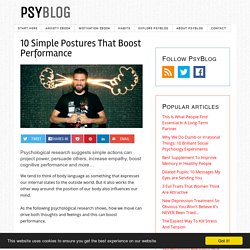

Maslows-hierarchy-of-needs1.jpg (1344×1000) 10 Simple Postures That Boost Performance. Psychological research suggests simple actions can project power, persuade others, increase empathy, boost cognitive performance and more… We tend to think of body language as something that expresses our internal states to the outside world.

But it also works the other way around: the position of our body also influences our mind. As the following psychological research shows, how we move can drive both thoughts and feelings and this can boost performance. 1. Pose for power If you want to feel more powerful then adopt a powerful posture. 2. Tensing up your muscles can help increase your willpower. 3. If you’re stuck on a problem which needs persistence then try crossing your arms. 4. If crossing your arms doesn’t work then try lying down. 5.
While you’re lying down, why not have a nap? Brooks & Lack (2005) compared 5, 10, 20 and 30 minute naps to find the best length. 6. The way people’s hands cut through the air while they talk is fascinating. 15 Styles of Distorted Thinking - StumbleUpon. The Art of Complex Problem Solving - StumbleUpon. 7 Innocent Gestures That Can Get You Killed Overseas. If you've ever had your penis cut off and/or been executed while on holiday, you'll probably know that it's easy to offend people from other cultures.
Unless you learn the ways of the place you're visiting, even the most well-meaning tourist can regularly find his oesophagus stuffed with burning goat. But surely just plain common sense and good manners will save you, right? Wrong. Extend Your Hand, Palm Outward in Greece What you think you are saying: "Phew! What you are actually saying: "Phew! What the hell? SHIT, is what we're saying here. If you really want to piss a Greek person off, you can go for the double moutza, which features both hands splayed above your head. Give the Thumbs-Up In The Middle East What you think you are saying: "Ayyyyy!
What you are actually saying: "Ayyyyy! What the hell? The thumbs-up sign has been confusing people for thousands of years. Finish Your Meal In Thailand / The Philippines / China. How to Stop Worrying - StumbleUpon. Undoing the Worrying Habit Once acquired, the habit of worrying seems hard to stop.

We're raised to worry and aren't considered "grown up" until we perfect the art. Teenagers are told: "you'd better start worrying about your future". If your worries aren't at least as frequent as your bowel movements, you're seen as irresponsible, childish, aimless. That's a "responsible adult" game rule. To the extent that worrying is learned/conditioned behaviour, it can be undone. Centuries-old cultural conditioning has given us a nasty neurosis: the belief that happiness must be "earned". Laid on top of the first neurosis is the idea that spending money will make you happy. So: we never stop working, we never stop spending money, we're never really happy – ideal conditions, coincidentally, for a certain type of slave economy.
You won't stop worrying if you think it serves you. The fight-or-flight response (FOF) is useful on rare occasions of real danger. The Phobia List. Color Psychology. By David Johnson Like death and taxes, there is no escaping color.

It is ubiquitous. Yet what does it all mean? Why are people more relaxed in green rooms? Why do weightlifters do their best in blue gyms? Colors often have different meanings in various cultures. Black Black is the color of authority and power. White Brides wear white to symbolize innocence and purity. Red The most emotionally intense color, red stimulates a faster heartbeat and breathing. The most romantic color, pink, is more tranquilizing. Blue The color of the sky and the ocean, blue is one of the most popular colors.
Green Currently the most popular decorating color, green symbolizes nature. Yellow. The Top 10 Psychology Studies of 2010. The end of 2010 fast approaches, and I'm thrilled to have been asked by the editors of Psychology Today to write about the Top 10 psychology studies of the year. I've focused on studies that I personally feel stand out, not only as examples of great science, but even more importantly, as examples of how the science of psychology can improve our lives. Each study has a clear "take home" message, offering the reader an insight or a simple strategy they can use to reach their goals , strengthen their relationships, make better decisions, or become happier. If you extract the wisdom from these ten studies and apply them in your own life, 2011 just might be a very good year. 1) How to Break Bad Habits If you are trying to stop smoking , swearing, or chewing your nails, you have probably tried the strategy of distracting yourself - taking your mind off whatever it is you are trying not to do - to break the habit.
J. 2) How to Make Everything Seem Easier.